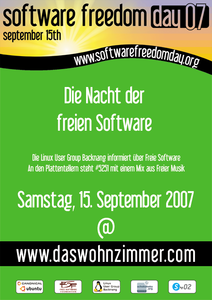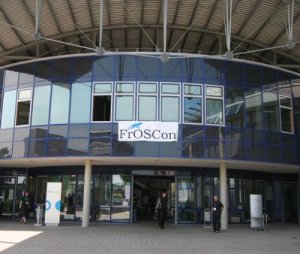Entries tagged as freesoftware
23c3 berlin ccc compiz drm dvb jugendumweltbewegung jukss königswusterhausen ökologie science theory tpm wiki 27c3 cellular frequency fsfe gsm lessig mobilephones openbsc openbts osmocombb privacy security wiretapping 3d aiglx blob driver gentoo graphics hardware linux metacity nouveau nvidia opengl xgl xorg 3ddrucker freiegesellschaft rapidprototyping reprap sciencefiction society adobe botnetz bsi evince flash kpdf leak marketing okular password passwort pdf poppler schlangenöl sicherheit snakeoil sumatrapdf zugangsdaten amusementpark asia beijing china cinderella copyright disney disneyland fake shijingshan stepmania travel trip2011 almaty asia2013 aviation azerbaijan baikal belarus border bus capsulehotel caspian ccp censorship childrensday chinghai climatechange coach dam dunhuang ecology erenhot erlian ferry flying greatfirewall guangzhou haikou hainan hohhot hongkong hostel hotel irkutsk journey kazakhstan khorgas kualalumpur language laos lenin listwjanka malaysia metro miradormansion mongolia moscow petropavl poland portbaikal publictransport pyramid qwerty rain rainforest russia sanya seat61 suprememaster terracottawarriors thailand tiananmen ticket train tram transport transsib transsiberian travelling typhoon ulaanbaatar ulan-ude ulanude urumqi vegan vegetarian visa warsaw waterpower weather windenergy xian xinjiang yanoda yekaterinburg yining zamyn-uud zensur ati ffmpeg gatos laptop presse r300 radeon randr12 tv tvout backnang ccwn film installparty kino kubuntu lug macos murrhardt softwarefreedomday ubuntu vista waiblingen windows base64 bash css script web altushost heartbleed ircbot malware openssl shellbot shellshock vulnerability 129a 1mai 24c3 a100 abgeordnetenhaus akongress akw allianz anarchiekongress antiatom atheismus atomkraft autobahn bahnhof belene bild brandenburg bundestagunited buskampagne bz creativecommons dataretention datenschutz demonstration dose elephantsdream energie energietisch energiewende freeculture freedomnotfear freifunk freiheitstattangst frequencies gott informationsfreiheit itu kamera kameraüberwachung kernkraft klima klimaschutz klimawandel kohle kohlekraft kongress kyoto mcplanet moleculeman musik ökostrom openstreetmap osm papst peterschaar piratenpartei polizeigewalt preise privatsphäre ratzinger re-publica re-publica09 religion rp09 rwe sony springer strom stromnetz tagebaue taz thermen topberlin treptow tuberlin überwachung umwelt umweltschutz unserwasser urgewald verkehr videoüberwachung volksbegehren vorratsdatenspeicherung wahl wasser wg windowsxp wirklimaretter wos wos4 youtube zimmer beryl compizfusion composite bios 1und1 benchmark cd dmidecode dvd eltorito grub harddisk iso lenovo memdisk mod motherboard optiarc pciids performance sata ssd syslinux t61 thinkpad bonn froscon froscon2007 siegburg talk bufferoverflow addresssanitizer afl americanfuzzylop asan c clang fuzzing gcc gimp memorysafety sunras useafterfree camera canon chdk digitalcamera english gadgets gammu gnokii gphoto ixus mobile nokia ptp time saturn 4k assembler bewußtsein braunschweig bsideshn c4 ca cctv certificate cryptography darmstadt easterhegg encryption entropia gpn gpn5 gpn6 gpn7 hacker hannover hash https karlsruhe licenses md5 mrmcd mrmcd100b mrmcd101b mysmartgrid papierlos passwörter pgp philosophie programmieren programming publicdomain querfunk radio rsa rsaoaep rsapss server sha1 slides ssl stuttgart surveillance tls transvalid überwachungskameras unicode utf-8 vortrag wahlcomputer wahlmaschinen wiesbaden x509 chemnitz clt lpi messe babelfish boluo boten casino chinese coffee copycat freizeitpark ghosttown googletranslate hallstatt huizhou journalismus luoyang mandarin northwestchina pressefreiheit russian tagesschau translation universaltranslator chromium chrome crash cve debian diffiehellman firefox forwardsecrecy ghost glibc keyexchange php redhat cinelerra gkm kohlekraftwerk mannheim thesource video videoediting code csrf freewvs sizeof xss codecs realmedia realvideo rv30 rv40 augsburg cacert come2linux essen games inkscape kde lit07 luga wine compression rar theunarchiver unar console homebrew wii wiibrew 68 aacs abmahnung alecempire aliens art banksy barrierefrei berneconvention bittorrent bitv blueray brigittezypries buch bücher bundestag cedric chaosradio corruptibles cpdl culturalflatrate culture di ebook epetition eu eucopyrightdirective evrimsen fanart fanfiction filesharing funkerspuk gema gemavermutung geodaten graffiti gutenberg gvl hddvd hiddenfrontier html ifpi illegalart iromance jankroemer justizministerium kinderlieder kopierschutz kriegderwelten kts kultur laterne laternenumzug markenrecht metis movies mpaa musikindustrie musikpiraten negativland netradio nocopy patent patente penguinbooks petition piratbyrån piratebay politik radiopolitik raubdruck raubkopie remix sanktmartin savenetradio spiritlevel startrek thepiratebay tomcruise trips tuxmas tuxmas07 usa usbstick verwertungsgesellschaft vgmusikeditionen vgwort vlc w3c warez webradio wipo wizo aavepyörä br breakcore copycan developingworld fdl freemusic fruechtedeszorns goa internet jamendo license microsoft movie nerosdaysatdisneyland ogg paniq pioneerone planet presserat python series vorbis breach cookies crime heist moodle s9y samesite serendipity websecurity accessibility heise internetexplorer max_width webdesign gobi helma javascript ddwrt firmware gargoyle router apt deb distributions fedora fma86t gnupg gpg notebook openpgp packagemanagement rpm signatures wlan desktop gnome mandriva metisse cardreader memorystick pcmcia ricoh samsung sd sdricohcs exe ico icons icoutils wrestool ape audacious fileformats flv gstreamer imagemagick konqueror legacy libav monkeysaudio mplayer multimedia realaudio retro retrocomputing shn shorten totem vc-1 voc vqf win32codecs wmv xine comic deathproof dvdr emilyrose enigma esoterik exorzismus filmkritik fluchderkaribik grindhouse homosexualität jacksparrow johnnydepp keiraknightley kirche marvel mond mondverschwörung orlandobloom piraten piratesofthecaribbean planetterror rodriguez spiderman superman tarantino turing verschwörungstheorie werbung berserk bleichenbacher browser clickjacking ftp mozilla nss poodle xsa zzuf france nancy rmll geo gps afra spam webapps wordpress bahn gedelitz modding p30 wendland wendlandcamp fsf lightwerk patents softwarepatents stallman gaia google googleearth reverseengineering arcade computergames computerspiele donkeykong escapa gajim gameandwatch gameboy instantmessaging jabber konsole konsolen lemmings lucasarts luigi mario monkeyisland nes nintendo nintendo64 olpc retrogames retrogaming scumm simcity spiele supermario supermariogalaxy tictactoe videogames xmpp zkm ac100 android developer freedomofspeech gebabbel gpsbabel idn iputils josm libressl merkaartor mobiletrailexplorer openbsd ping politics smartbook subnotebook toshiba x1carbon freedesktop gtk kgtk qt standards usability bypass geographie googlemaps passwordalert atm display dsl energiesparen garmin hddtemp lm_sensors lspci lsusb mapsource ntbba p35 quest routing support usbids ibm windowsrefund ngm scientology sekten universellesleben vogelgrippe grenzendeswachstums peakoil wachstum wachstumskritik agenda21 apache barcamp blog bnn bodensee bundesverfassungsgericht co2 datensparsamkeit ejc enbw fricard gamer geocaching informationdisclosure jonglieren killerspiele kubik mysql openexpo opensourceexpo press rfid rhein simplesharingextensions stadtmitte steinkohle uni web20 webmontag akademy ct esslingen ludwigsburg ice modem steckdose winmodem artikel augsburgerallgemeine core coredump cpu cpufreq delilinux demoscene distribution frankreich grsecurity howto hp http iptables lpic lugbk network omnibook overheatd overheating pcmagazin proxy schokokeks segfault smart smartmontools sncf squid symlink usb webhosting webinale webroot webserver zeitung webinale07 etymologie schäuble wga argentinia cinema cubacrisis magneto nazi prequel xmen xmenfirstclass echoes nessus openvas anarchismus auto benken benzin biblis bookchin brunsbüttel castor deutschewelle endlager energiesparlampe flughafen gentechnik gorleben grüne hamburg hitzacker kapitalismus klimacamp kompaktleuchtstoffröhre led loremo mainz marslight mon810 monsanto moorburg nürtingen oberboihingen pkw schlemm schweiz stromsparen stromverbrauch tiefenökologie umweltbewegung verkehrspolitik weinland xq certificateauthority email privatekey rc2 smime sni symantec badcannstatt cannstatt cccs earth exif geotagging gpx jpeg kaisersbach mars media osm2poly osmosis rtl sfd spiegel tomorrow phoronix content-security-policy cookie csp drupal gallery infoleak mantis pdo session sniffing squirrelmail stacktrace schwäbischestaglatt sexismus agb antigenozidbewegung aok datamining db diy einkaufen frankfurt hausdurchsuchung humanistischeunion innenpolitik justiz key köln mobil optoutday rechtsbeugung richtervorbehalt schlüssel sha2 steuerid steuernummer verschlüsselung 3dprinter ikea obsolescence recycling repair atari blinkenlights brownbox computerhistory magistral museum painstation pong pongmechanik pongmythos tankodrom wkv blowfish onlinetvrecorder otrkey schneier cablemodem climate d-link efficiency eletricity environment firewall kabeldeutschland o2 tcp zyxel sqlinjection 0days bias busby conflictofinterest hacking journalism rand study vulnerabilities zerodays adguard aead aes algorithm antivir antivirus auskunftsanspruch axfr azure badkeys bigbluebutton bugbounty bundesdatenschutzgesetz bundestrojaner cbc cccamp11 cfb chcounter clamav cloudflare cmi cms crypto dell deolalikar dingens diploma diplomarbeit dns domain edellroot eff eplus facebook fileexfiltration fortigate fortinet freak git gnutls gsoc hackerone internetscan itsecurity jodconverter joomla kaspersky komodia libreoffice luckythirteen maninthemiddle math mephisto milleniumproblems mitm modulobias napster netfiltersdk newspaper nist ntp ntpd observatory onlinedurchsuchung openid openidconnect openleaks otr owncloud padding panda phishing pnp privdog protocolfilters provablesecurity pss random rss salinecourier sha256 sha512 snallygaster sso staatsanwaltschaft subdomain superfish thesis tlsdate toendacms unicef update updates userdir virus calendar ipv6 mod_rewrite architecture astana baiterek crookedforest forest gryfino khanshatyry migrationpolice nature places ard ardget audio cartoon deutschland download feuerwerk filter fireworks flvstreamer fußball kapitalismuskritik kickit krisis mediathek mitschnitt nationalismus rtmp rtmpdump theorie wm bugtracker github nextcloud acid3 midori webkit webstandards esowatch skeptizismus absturz okte

 Heute ist der erste Tag auf der
Heute ist der erste Tag auf der  Binary drivers are imho a hughe problem for free software. Nvidia, leading graphics company, has produced binary linux drivers for a long time and there was no way to get free software 3D-support on their cards.
Binary drivers are imho a hughe problem for free software. Nvidia, leading graphics company, has produced binary linux drivers for a long time and there was no way to get free software 3D-support on their cards.